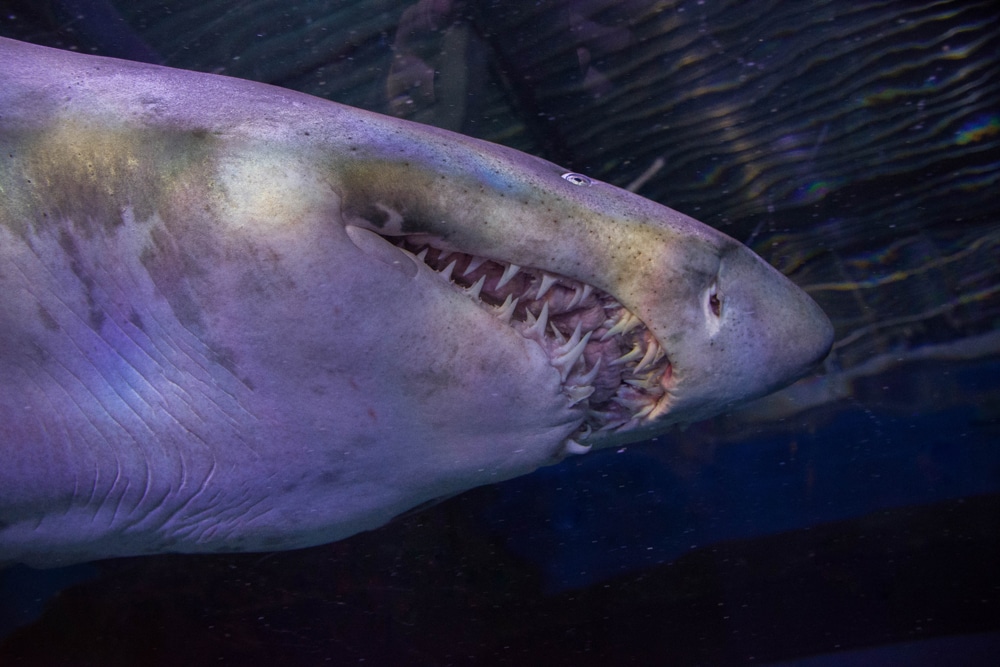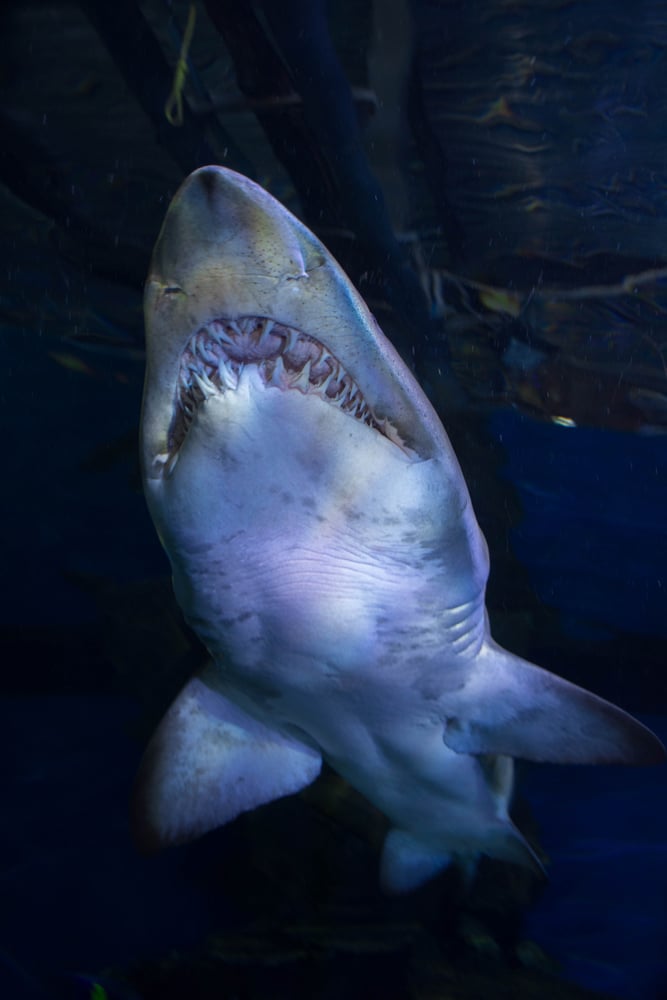News
Introducing the Shark Family

In the last article I introduced you to Blue Planet Aquarium’s Dive team as well as some of our Sharks. But in this article I’ll be going into more detail about the biggest sharks in our collection, the Sand Tiger Sharks, and I’ll be going over their individual personalities and behaviours as well as a little bit about how we look after their individual needs.
Firstly, these Sand Tiger Sharks are a close relative of the White Shark and Goblin Shark and range throughout the world’s oceans in both temperate and tropical seas, they have many names throughout their range, such as Ragged tooth Sharks, “Raggies”, in places such as South Africa or Grey Nurse Sharks in Australia. Even though Sand Tigers have quite a fearsome appearance judging by their denture, they’re actually incredibly docile and very nice natured, which is why they’re so popular in Aquarium’s around the world. Sand Tigers are also incredibly easy to care for in aquariums, as long as they have enough space and food, they’re perfectly happy.
At Blue Planet, we Feed our Sand Tiger’s three times a week and offer one fish per shark each feed, which usually equates to around 2% of the Sharks body weight per week, which is more than enough. We feed our Sharks on a variety of foods such as Mackerel, Whiting and Saury but the main thing we feed them is Trevally (small Jackfish).
The Dive Team here at Blue Planet Aquarium have what we call a mutually beneficial relationship with the Sharks and it’s a very simple relationship, we know that the main tank is the Sharks home and that we are just guests in their home. The Sharks demand space and respect so we make sure to oblige and allow the sharks to move where they want, when they want, and we will always give way to the sharks. Through respecting the shark’s needs, the sharks learn to respect us, and therefore on occasions where we require space in order to carry out tasks in the tank, the Sharks oblige us, as we have done for them on all the other occasions.
We have five Sand Tigers at Blue Planet Aquarium, three males and two females and each one has its own distinct personality. Our Eldest Shark is Wilma who came to us back in 1998 when the aquarium first opened, she came from an aquarium in New York and is known as the “Grandma Shark” or the “Grey Lady” as she’s a more pale or Greyish colour compared to the rest. She’s around 50 years old however we do not have an exact age, but we do know that’s she’s very old in terms of a Sand Tiger’s lifespan as their average wild life expectancy is round 25 years old.
Our largest Shark is Betty, who came to us along with one of our males Alfie, when they both came they were named ‘Thunder’ (Betty) and ‘Lighting’ (Alfie) but whilst being quarantined they were nicknamed ‘Shark A’ (Alfie) and ‘Shark B’ (Betty) and those are the names that stuck, hence what we know them as today. We estimate Betty to be around 11-foot-long and weighs in excess of 35 stone, she sleeps for most of the day but is personally my favourite shark as she is an incredible animal to see on dives just due to her massive size. Alfie is who we call our “Crazy Male” as he gets quite excited during mating season, he does this because he’s showing off to the females and is trying to establish his dominance over the other males.
Flare is our Alpha Male and is so named as his Jaw “flares” out of his mouth and makes him look a little more unusual than the others, this was caused when he had a gum infection when he was younger. When Sharks feed they dislocate their top jaw in order to help give that extra few inches to grab their prey but Flare had a gum infection that stopped him from retracting his jaw back in, however he was checked by several vets who stated that it’s a fairly common occurrence in captive and wild Sand Tiger Sharks and was told that it shouldn’t cause any issues, and thankfully it hasn’t as he has been living happily and healthily at the aquarium since we opened in 1998.
Our youngest and smallest male is Dingle, he came to us around 8 years ago from Dingle Aquarium in Dingle, Ireland. He’s only been involved in the last 4 mating seasons since he matured and gets quite excited in the first 1-1½ months of the three-month mating season until the more dominant sharks Flare and Alfie join in which is when he relaxes, allowing the more dominant males to step in. Dingle is an absolute delight to work with as he’s probably the most relaxed Sand Tiger out of our group.
So, there you have it our Sand Tiger family! This is merely just scratching the surface of these amazing animals and even though we spend every day with them, they never cease to amaze and surprise us.
For more information please visit the Blue Planet Aquarium website by clicking here.
Follow Donovan on Instagram at www.instagram.com/donovans_reefs
Gear News
Introducing the TR-80, IR-50 and CS-30 Regulators from DYNAMICNORD

Whether you are a beginner or a professional diver – with the three new main regulators from DYNAMICNORD, everyone will find their favourite regulator. They all look super stylish.
Excellent performance with the TR-80
Quality and performance are the be-all and end-all for regulators. It is not for nothing that the TR stands for Tec Reg. The innovative design of the TR-80 guarantees absolute reliability – even in ice-cold waters.

Perfect breathing effort at 0.8 J/l / certified for diving in waters below 10 degrees / structural design made of solid brass for best cold protection / membrane-compensated design with dry seal of the first stage / reduced exhalation effort thanks to optimized exhalation membrane and bubble deflector / adjustable Venturi (dive/predive) and adjustment knob for individual inhalation comfort / innovative design of the front cover prevents free-flow in strong currents or when diving with scooters / design made of sandblasted brass, matt chrome finish / 2 HP and 4 LP outlets / mouthpiece made of high-quality, anti-allergic silicone for maximum comfort.


Amazing underwater adventures with the IR-50
The IR-50 is the top regulator for advanced and experienced divers. Natural breathing is the essence of this regulator.

Ideal breathing effort at 0.8 J/l /certified for diving in waters below 10 degrees / compensated membrane / adjustable venturi (dive/predive) and adjustment knob for individual inhalation comfort/ outlet valve and deflector for minimum exhalation effort and reduction of bubbles on the face / design made of sandblasted brass, matt chrome finish / 2 HP and 4 NP outlets / mouthpiece made of high-quality, anti-allergic silicone for maximum comfort.


The Workhorse – our CS-30
For diving centres and diving beginners – the workhorse stands for strong construction, reliability and robustness. Perfect for your training.

Optimal breathing effort at 0.8 J/l /recommended for diving in waters above 10 degrees / non-compensated piston / adjustable venturi (dive/predive) / outlet valve and deflector for minimum exhalation effort and reduction of bubbles on the face / design made of sandblasted brass, matt chrome finish / 1 HP and 3 NP outlets / mouthpiece made of high-quality, anti-allergic silicone for maximum comfort.


Octopus OP-30
The OP-30 is the ideal addition to all DYNAMICNORD regulators. It is identical in construction to the CS-30.

The TR-80, IR-50, CS-30 (DIN & INT) regulators and the Octopus OP-30 are available from DYNAMICNORD dealers and in the online store.
DYNAMICNORD – Your Outdoor Companion.
Marine Life & Conservation
Paul Watson Released as Denmark Blocks Japan’s Extradition Bid

Renowned anti-whaling activist Paul Watson has been released from custody in Greenland after spending five months in detention. Denmark’s Justice Ministry rejected Japan’s request for his extradition, citing insufficient guarantees that his time already served in custody would be credited against any potential sentence.
The 74-year-old Canadian-American was arrested on July 21 in Nuuk, Greenland’s capital, when his ship docked to refuel. His arrest was based on a 2012 Japanese warrant related to a 2010 encounter in Antarctic waters. Japan alleged Watson obstructed operations and caused damage to a whaling research ship during efforts to disrupt illegal whaling. Watson has consistently denied these claims, maintaining his commitment to marine conservation.
Denmark, which oversees extradition matters for Greenland, concluded that while the legal conditions for extradition were met, the lack of assurances from Japan regarding time-served credit made extradition untenable.
In a video shared by his foundation, Watson expressed gratitude and relief, saying, “After five months, it’s good to be out… and good to know they’re not sending me to Japan.” He added that the most difficult part of his time in custody was being separated from his two young sons.
Watson is a pioneering figure in marine conservation, known for founding the Captain Paul Watson Foundation in 2022 after decades of activism with the Sea Shepherd Conservation Society. His bold efforts to defend marine life have earned him widespread support, including from celebrities and conservationists. His work has also been featured in the acclaimed reality TV series Whale Wars.
Watson’s lawyer, Jonas Christoffersen, praised the decision, stating, “We are happy and relieved that Paul Watson is now free.” He added that Watson is eager to reunite with his family and continue his vital work.
The arrest occurred while Watson’s vessel, the M/Y John Paul DeJoria, was en route to the North Pacific with a team of 26 volunteers to intercept a Japanese whaling ship. His foundation described the arrest as politically motivated and emphasized that Watson’s actions were focused on ending illegal whaling practices.
Japan resumed commercial whaling in 2019 after leaving the International Whaling Commission, asserting that whale meat is a cultural tradition. Conservationists, however, continue to challenge these practices, highlighting their impact on marine ecosystems.
Despite the challenges, Watson remains steadfast in his mission to protect marine life and bring attention to whaling practices. His dedication to ocean conservation has made him a globally respected advocate for the environment.
-

 News2 months ago
News2 months agoIconic SS United States to become the World’s Largest Artificial Reef
-

 News3 months ago
News3 months agoBook Review – 52 Assignments: Underwater Photography
-

 Gear News3 months ago
Gear News3 months agoDYNAMICNORD – New German diving brand enters the British market
-

 News3 months ago
News3 months agoExploring Cenote El Pit: A Diver’s Dream
-

 Gear News3 months ago
Gear News3 months agoTry BARE drysuits (and maybe even win one!) this Friday with Sea & Sea at North West Dive Fest
-

 Marine Life & Conservation3 months ago
Marine Life & Conservation3 months agoBook Review: Coral Triangle Cameos
-

 Blogs2 months ago
Blogs2 months agoDive the Egyptian Red Sea this Autumn with Regaldive
-

 News3 months ago
News3 months ago2024 Ocean Art Underwater Photo Competition Announced

















